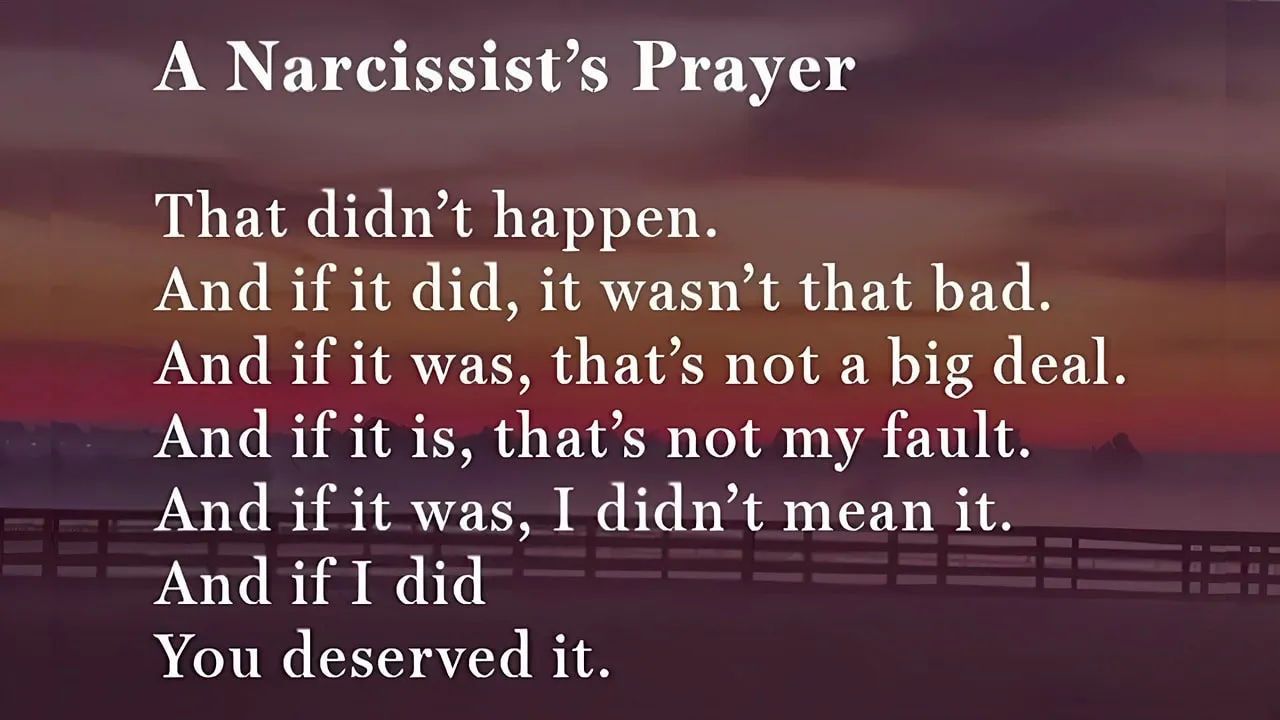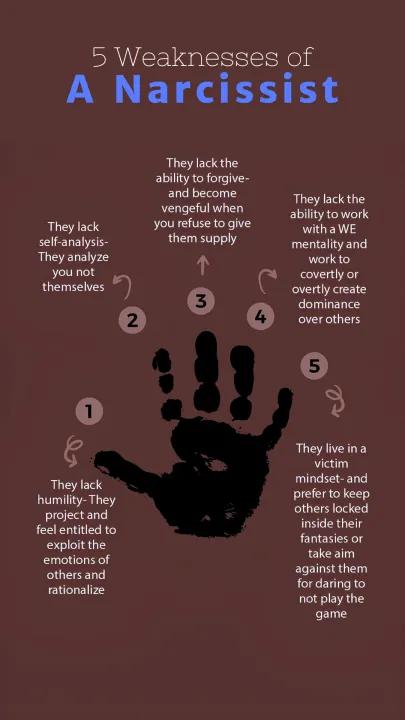Today's Thursday • 8 mins read
Narcissists come across as charming and confident to most of us, at least initially.
They show they are in charge by commanding attention when they’re around. They demand special treatment, making us walk on eggshells around them.
But underneath, they have a few weaknesses. They feel ashamed, fear being unmasked, and can’t trust others because of these.
Many of their harmful behaviors can be explained by these inner struggles.
Let’s explore five key character vulnerabilities of narcissists.
1. Entitled Ego: Narcissists feel unjustly entitled to exploit others.
- They believe they are above scrutiny and authorized to use people freely.
- Their inflated ego blinds them to how their actions affect others’ well-being.
- Their arrogance makes them justify their falsehoods and further marginalize others.
- They exploit others’ vulnerabilities without any remorse, shame, or intent of apology.
- They always carry a sense of entitlement, expecting others to cater to their needs and wants.
Narcissists often struggle with humility. You’ll rarely see a grandiose narcissist being modest or humble. They think on the lines of,
“The world exists for me. People exist to serve me.”

Most of them think that they are highly important and deserve special treatment. But they haven’t done anything to earn this special treatment, so their sense of entitlement is unjustified.
This is a weakness, as it makes them reluctant to admit when they’re wrong.
- You’ll rarely hear them apologize sincerely. A narcissist’s apology is usually fake.
- They do not have the emotional mechanism to consider other people’s feelings. So, they will brazenly take advantage of or manipulate others to get what they want.
- They could make their target feel guilty so that person will do something for them.
- They could shower someone with love and praise just to gain their loyalty.
When questioned about this, they will make excuses or justify their actions:
“I did it because I care about you.”
“You’re too sensitive.”
They will deflect blame and twist the story to make themselves look better. But not take responsibility for a bad thing that happened because of them.
Eventually, people recognize this lack of humility and exploitative behavior as their default nature. And decide not to trust this person who doesn’t respect their emotions and is a perpetual “taker”—always taking, never giving.
The best way to deal with this side of them is to set clear boundaries.

- Tell them firmly you won’t tolerate them trying to manipulate you or dismiss your words/feelings.
- Stand your ground, even if they try to rationalize their behavior.
- Don’t rely on them too heavily for support or validation.
- You may need to limit your time with them.
No matter how big the narcissist in your life is, you deserve to be treated with kindness and respect.
2. Blind Spots of Self-Awareness: Narcissists cannot assess their own behaviors.
- Their actions lack introspection — they fail to understand the consequences of their behavior.
- Their ignorance of their own faults leads them to repeat harmful patterns without reflection.
- They are unrepentant of their own flaws, projecting blame onto others instead of self-reflecting.
- Their lack of insight prevents them from recognizing the damage they cause to relationships.
- They live in denial, refusing to acknowledge their shortcomings and refusing to grow.
Self-awareness means looking inward and willingly acknowledging both your strengths and flaws. Narcissists struggle with this.
- They are too focused on creating a perfect, superior self-image. This blinds them to their self-centered motives and acts.
- They cannot spot, accept, or change their hurtful patterns, which leads to repeated relationship problems.
- They can’t reflect on how their words and actions affect others.
- Worse, when someone points out their flaws, they get defensive.
This refusal to take the blame is a weakness.
Normal people leverage their mistakes to learn and grow.
But not the narcissists. They’re not putting themselves in the hurt person’s shoes to feel the pain. They would rather be Mr./Ms. “Always” Right.
So, it’s hard for them to grow. They miss out on chances to become better people—partners, friends, or colleagues.
If you’re close to a narcissist, you’d notice the excessive use of “I” statements.
- Your narcissist can say, “I feel disrespected when you criticize me in front of others.”
- But if you counter with, “What about my feelings that you hurt?”
- They’ll fire back their “Oh, you’re too sensitive!”
Don’t bend over your back to maintain the relationship. Your mental health takes priority over your relationship with them.
3. Unforgiveness: Narcissists harbor grudges and plot vendettas.
- They harbor grudges for years, sometimes for life, for perceived slights.
- They see forgiveness as weakness and retaliation as asserting dominance.
- Their inability to let go of past hurts keeps them on a slow-boil with anger.
- Instead of forgiveness, they prefer “giving it back” to those who cross them.
- They hold on to old issues and ‘digs’, seeking revenge at an opportune moment.

Narcissists can’t forgive easily. Their fragile ego would rather “get even” with someone who criticizes or opposes them.
They can’t help but plot revenge and vendetta against those who (they think) showed them down.
They can’t accept that when we forgive an offender, the forgiveness is for ourselves first.
This unforgiving nature traps them in a cycle of anger, resentment, and unhappiness.
Narcissists see criticism, feedback, and even differing opinions as personal assaults. They can get offended by something too trivial for us to notice. They will make it a point to remember it and wait for the right moment to give it back.
If you’ve upset a narcissist:
- Avoid getting into an argument with them. They can wear you down with their drama.
- Just disengage even before they try to lash out at you. Later, set boundaries with them.
- Don’t take it personally. Their inability to forgo or forgive is more about them than you.
- Don’t apologize too much to please them. They can use it as a bargain to control you in the future.
Don’t try to reason with a narcissist because you cannot predict or control their reactions.
4. Lonely At The Top: Narcissists struggle to collaborate with others as equals.
- They view collaboration as an opportunity for dominance rather than mutual benefit.
- Their desire for control prevents them from working with others on an equal footing.
- Collaboration becomes a power struggle, with them seeking to assert their superiority.
- They undermine teamwork by prioritizing their own agenda over collective goals.
- Their refusal to collaborate as equals stems from a need for control and superiority.
They find it hard to share power and decision-making. Their default is to dominate conversations, dismiss others’ ideas, and insist on having things their way.
They can take credit for others’ work and refuse to acknowledge the contributions of the team.
These undermine the spirit of true collaboration. Because true collaboration is about give-and-take, compromise, and valuing others’ ideas and contributions.
- If you work with narcissists, establish clear roles and goals of collaboration. Ask them to respect the input of the group and contribute to shared goals.
- Praise them in clear ways, like, “I appreciate how you delegated tasks, so everyone could participate.” This may gradually help them see the value of collaborative efforts.
- However, be prepared for resistance and defensiveness. They believe and act like the first among equals.
- They may not show direct insubordination. But can nudge their posse of “Yes people” to fight their fights.
5. Victim Mentality: Narcissists feel they are victims and lash out at others.
- They adopt a victim mentality, blaming others for their shortcomings and failures.
- Their default is to “save their own skin” and make the mistake look like someone else’s work.
- They can convincingly play the victim to garner sympathy and justify their mistreatment of others.
- Their victim mindset doesn’t show up unless faced with the severe consequences of their actions.
- They project their insecurities onto others, painting themselves as victims to evade accountability.
Narcissists often feel the world is against them and that everyone is out to exploit them. This is a projection of their own behavior onto others (narcissistic projection).
They constantly complain about being mistreated or unappreciated, blaming others for their problems.
Even when they haven’t been hurt, they may perceive themselves as victims and lash out with verbal assaults, silent treatments, or attempts to turn others against their perceived enemies.
This “poor me” attitude makes it exhausting to live or work with them. Their accusations and aggressive reactions create a tense, unpredictable environment.
Many narcissists grow old believing the world has always been against them and that no one has ever done anything good for them.
An old narcissist often rues that he should not have done so much for others. Since all others did was treat him badly and never made him feel valued.
This gives them an excuse for their failures and their relationship issues. And lets them see themselves as innocent victims.
- Don’t try to remind them what you’ve done for them when they play the victim. It’s useless.
- They’ll accuse you — don’t take it personally. They harbor grudges against the whole world.
- Refuse to enable their self-pitying victim game. Walk away before they get aggressive.
Final Words
To keep yourself safe from a narcissist:
- Set clear boundaries with them.
- Don’t try to fix or correct them.
- Prioritize your well-being and happiness.
√ Also Read: 17 Troubling Things Narcissists Do When Relationships End
√ Please spread the word if you found this helpful.
• Our Story!
» You deserve happiness! Choosing therapy could be your best decision.
...
• Disclosure: Buying via our links earns us a small commission.

